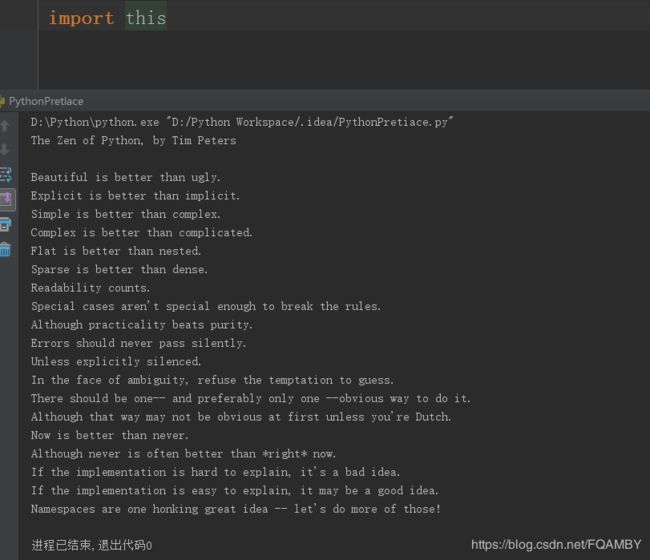- 华为OD机考2025B卷 - 最多几个直角三角形(Java & Python& JS & C++ & C )
算法大师
最新华为OD机试真题华为OD机试真题(Java/JS/Py/C)javapython华为OD机考2025B卷javascript华为odC++C语言
最新华为OD机试真题目录:点击查看目录华为OD面试真题精选:点击立即查看题目描述有N条线段,长度分别为a[1]-a[n]。现要求你计算这N条线段最多可以组合成几个直角三角形。每条线段只能使用一次,每个三角形包含三条线段。输入描述第一行输入一个正整数T(1#
- Day08-Flask 或 Django 简介:构建 Web 应用程序
清幽竹客
Pythonflaskdjangopython
Flask或Django简介:构建Web应用程序网络开发领域提供了丰富的工具和框架,而Python作为一门多功能的语言,在构建健壮且可扩展的Web应用方面脱颖而出。本课程将作为你使用Python进行Web开发的入门指南,特别聚焦于两个流行的框架:Flask和Django。我们将探讨这些框架背后的基本概念,为你创建动态Web应用和RESTfulAPI奠定基础。理解这些框架对于将AI模型集成到Web应
- 【附源码】基于flask框架求职招聘网站 (python+mysql+论文)
本系统(程序+源码)带文档lw万字以上文末可获取本课题的源码和程序系统程序文件列表系统的选题背景和意义选题背景:随着互联网技术的飞速发展,网络求职招聘已经成为了现代人才市场的一大趋势。传统的求职招聘方式逐渐被线上平台所取代,这主要得益于网络平台的便捷性、实时性和广泛性。然而,现有的求职招聘网站虽然数量众多,但质量参差不齐,用户体验也各不相同。一些求职者和招聘者在面对海量信息时,往往会感到无所适从,
- 解决更新python版本后,虚拟环境不可用的问题
Superstarimage
diffusers编程pythonpython人工智能开发语言
因为安装xformers,需要额外加装triton,而triton需要的python版本(3.10)高于我当前虚拟环境的版本(3.8),因此博主手动提升了当前虚拟环境的版本:condainstallpython=3.10结果应用该虚拟环境时,始终报如下错误:(TrainControlNet)F:\XYX\Documents\SpongeCakeInverse\AITools\the3rdparty
- Hadoop MapReduce入门
且行且安~
数据分析进阶之路Linux命令hadoopMapReduce入门
入门简介计算过程分为两个阶段Map和ReduceMap阶段并行处理输入数据Reduce阶段对Map结果进行汇总针对python语言来说:map函数或者reduce函数来说,输出的数据格式为元组tuple一个简单的MapReduce程序只需要指定map()reduce()input()output()剩下的由框架完成。Linux常见命令:-读取文件(文本文件,在Windows下使用记事本打开的文件)
- 【机器学习笔记 Ⅱ】4 神经网络中的推理
推理(Inference)是神经网络在训练完成后利用学到的参数对新数据进行预测的过程。与训练阶段不同,推理阶段不计算梯度也不更新权重,仅执行前向传播。以下是其实现原理和代码示例的完整解析:1.推理的核心步骤加载训练好的模型参数(权重和偏置)。前向传播:输入数据逐层计算,得到输出。后处理:根据任务类型解析输出(如分类取概率最大值,回归直接输出)。2.代码实现(Python+NumPy)(1)定义模型
- 【零基础学AI】第29讲:BERT模型实战 - 情感分析
1989
0基础学AIbert人工智能深度学习神经网络cnnpython自然语言处理
本节课你将学到BERT模型的核心原理与优势HuggingFaceTransformers库的BERT接口使用情感分析任务的完整实现流程模型微调(Fine-tuning)技巧开始之前环境要求Python3.8+需要安装的包:pipinstalltorchtransformersdatasetspandastqdmGPU推荐(可加速训练)前置知识第28讲Transformer基础基本PyTorch使用
- 【零基础学AI】第27讲:注意力机制(Attention) - 机器翻译实战
1989
0基础学AI人工智能机器翻译自然语言处理pythontensorflow机器学习神经网络
本节课你将学到理解注意力机制的核心思想掌握注意力计算的数学原理实现基于注意力机制的Seq2Seq模型构建英语到法语的神经翻译系统开始之前环境要求Python3.8+需要安装的包:tensorflow==2.8.0numpy==1.21.0matplotlib==3.4.0pandas==1.3.0前置知识RNN/LSTM原理(第26讲)序列数据处理(第26讲)自然语言处理基础(第14讲)核心概念为
- Python: 如何用Python的迭代器或生成器实现斐波那契数列
KevinShi_BJ
python
斐波那契数列(Fibonaccisequence)是指这样一个数列:1,1,2,3,5,8,13,21,34,55,89...这个数列从第3项开始,每一项都等于前两项之和。斐波那契数列的定义者,是意大利数学家莱昂纳多·斐波那契(LeonardoFibonacci)。以兔子繁殖为例子而引入,故又称为”兔子数列“。斐波那契数列又称黄金分割数列,n越大,相邻两值的比越接近黄金分割0.618,非常有趣。百
- Python实现布林带策略完整代码
程序化交易助手
量化软件Python程序化交易Python量化炒股PTradeQMT量化交易量化软件deepseek
Python实现布林带策略完整代码布林带是个啥玩意儿?我见过太多新手一上来就问"布林带能不能赚钱",这问题就跟问"菜刀能不能切菜"一样。布林带就是个工具,关键看你怎么用。简单来说,它就是在均线上下画两条通道线,股价大部分时间都在这个通道里晃悠。记得去年有个客户,拿着布林带当圣杯,结果亏得妈都不认识。后来我给他看了我的Python策略代码,这哥们才明白原来工具要配合仓位管理和止损。现在他账户已经翻倍
- 从亏损到盈利:用Python实现WVAD策略,量价结合更靠谱
程序化交易助手
量化软件Python程序化交易Python量化炒股PTradeQMT量化交易量化软件deepseek
从亏损到盈利:用Python实现WVAD策略,量价结合更靠谱那个让我夜不能寐的亏损账户去年有个客户老张来找我,50万本金半年亏了15万。他红着眼睛问我:"为什么我跟着大V买卖还是亏?"我看了他的交易记录就明白了——全是凭感觉操作,涨了追,跌了割,完全被市场情绪牵着鼻子走。这让我想起自己刚入行时,盯着分时图眼睛发酸的日子。直到有天看到营业部老总桌上那本《量化交易入门》,才恍然大悟:原来职业玩家都在用
- python分支语句_python入门基础教程10 python的分支语句
weixin_39604280
python分支语句
if分支语句分支语句的作用是在某些条件控制下有选择的执行实现一定功能语句块。if分支语句则是当if后的条件满足时,if下的语句块被执行,语法格式如下所示:if:statements让我们看看代码吧。>>>sex='male'>>>ifsex=='male':print'Man!'#此处有两次回车键Man!>>>ifsex=='female':print'Woman'#此处有两次回车键>>>if_e
- Python 分支语句,分支语句嵌套,三目运算
龙技术
Python语法python
1、分支语句单一条件判断if条件:条件成立时执行的代码#格式:'''if条件:条件成立时执行的代码'''age=int(input('请输入你的年龄:'))#上网ifage>=18:print('小帅哥快来玩啊')print('回家睡觉')对立条件判断if条件:条件成立时执行的代码else:条件不成立时执行的代码#if...else...'''if条件:条件成立时执行的代码else:条件不成立时执
- 十五天Python系统学习教程第十五天
Day15详细学习计划:Python综合项目实战与学习路径规划学习目标✅综合运用前14天知识完成完整项目开发✅掌握生产级项目架构设计与优化技巧✅制定后续学习计划与技能提升方案✅理解Python工程化开发最佳实践一、实战项目:企业级任务管理系统1.1项目需求核心功能:用户认证(JWT令牌)任务CRUD与状态流转(待办/进行中/已完成)任务分类与优先级管理数据统计可视化(任务完成率/耗时分析)邮件通知
- Python分支语句注意事项
乔代码嘚
python开发语言github
一、单分支语句:if语句1.语法:if:语句块2.注意事项:1)if语句首先判断的结果值,如果结果为True,则执行语句块里的语句序列。如果结果为False,语句块里的语句会被跳过;2)语句块是if条件满足后执行的一个或多个语句序列;3)语句块中语句通过与if所在行形成缩进表达包含关系。4)if判断语句还可以简写:iftag:print("True")当x为0、0.0、0j、None或者空的字符串
- python函数
四、函数定义P.1函数定义把一段实现某个功能的完整代码,用一个函数封装,后期可以通过调用函数名,实现依次编写,多次调用的目的函数,可以等价于我们初高中学过的f(x),f是运算法则,也就是代码函数中对应的代码执行块,每有一个x对应经过f运算之后得到一个值,如f(x)对应的是让x乘3加2,每有一个x进入f中便会得到一个值。高中对应的函数三要素是,定义域、运算法则、值域,而编程中的函数也有三要素,分别为
- Python程序员如何制定学习计划?提高编写代码的能力
在工作和生活压力之下,如何提升自己的技能和能力?这是许多人都面临的问题。如果你也有这样的问题,那么首先要明确的是,要想提升自己的能力,必须要有一个清晰的计划和方向。这个计划可以是长期的,也可以是短期的,但必须要有一个大的方向性。接下来,我们来看看如何制定一个有效的计划。如果你不知道如何制定计划,其实很简单。你可以闭上眼睛,想一想自己哪些方面比较薄弱,比如多线程锁、Spring的一些核心技术源码、分
- Python: 包
一、Python包基础概念1.1什么是Python包Python包(Package)是一种组织Python模块的方式,它使用目录结构来组织相关的模块。一个包本质上是一个包含__init__.py文件的目录,该文件可以是空的,也可以包含包的初始化代码。my_package/├──__init__.py├──module1.py└──module2.py1.2包与模块的区别模块(Module):单个.
- PyTorch 详细安装教程及核心API使用指南
慕婉0307
pytorchpytorch人工智能python
一、PyTorch简介PyTorch是由FacebookAIResearch(FAIR)于2016年开发的开源深度学习框架,现已成为学术界和工业界最受欢迎的深度学习工具之一。其核心优势在于采用了动态计算图(DynamicComputationGraph,又称"define-by-run"机制),这使得开发者能够像编写普通Python代码一样构建神经网络,并在运行时动态调整计算图结构,大大提高了研究
- python爬虫正则表达式使用说明
yuwinter
Pythonpython爬虫正则表达式
Python爬虫和正则表达式是自动化网络数据提取中常用的两种技术。本文将详细介绍如何使用Python编写爬虫,结合正则表达式提取网页中的数据。一、基础知识点1.安装必要库爬虫通常需要使用库来处理HTTP请求和解析网页,常用库有:requests:用于发送HTTP请求,获取网页内容。re:Python自带的正则表达式库,用于模式匹配和提取数据。BeautifulSoup(可选):如果你需要更高级的网
- python:正则表达式符号
初于青丝mc终于白发
python相关正则表达式pythonpycharm
本次给大家带来的是python中的正则表达式符号的复习呀,还记得清楚嘛^^?匹配零次或一次前面的分组*匹配零次或多次前面的分组+匹配一次或多次前面的分组{n}匹配n次前面的分组{n,}匹配n次或更多次前面的分组{,m}匹配零次或m次前面的分组{n,m}匹配至少n次,至多m次前面的分组{n,m}?、*?、+?对前面的分组进行非贪心匹配^spam意味着字符串必须以spam开始spam$意味着字符串必须
- Python: 正则表达式
慕婉0307
python基础知识点正则表达式
正则表达式是处理文本数据的强大工具,Python通过re模块提供了完整的正则表达式功能。本文将详细介绍Python正则表达式的使用方法,包括基础语法、高级技巧和re模块API的详细解析。一、正则表达式基础1.1什么是正则表达式正则表达式(RegularExpression)是一种用于匹配字符串中字符组合的模式,可以用于搜索、替换和验证文本数据。1.2Python中的re模块Python通过内置的r
- PythonOCC-core项目中的Wayland显示支持探索
颜如良
PythonOCC-core项目中的Wayland显示支持探索pythonocc-coretpaviot/pythonocc-core:是一个基于Python的OpenCASCADE(OCCT)几何内核库,提供了三维几何形状的创建、分析和渲染等功能。适合对3D建模、CAD、CAE以及Python有兴趣的开发者。项目地址:https://gitcode.com/gh_mirrors/py/pytho
- 【Python 算法零基础 4.排序 ⑦ 桶排序】
L_cl
Python常见算法排序算法数据结构算法
草木不争高,争的是生生不息——25.5.26选择排序回顾①遍历数组:从索引0到n-1(n为数组长度)。②每轮确定最小值:假设当前索引i为最小值索引min_index。从i+1到n-1遍历,若找到更小元素,则更新min_index。③交换元素:若min_index≠i,则交换arr[i]与arr[min_index]。'''①遍历数组:从索引 0 到 n-1(n 为数组长度)。②每轮确定最小值:假设
- 【Python 算法零基础 4.排序 ⑥ 快速排序】
L_cl
Python常见算法排序算法算法
既有锦绣前程可奔赴,亦有往日岁月可回首——25.5.25选择排序回顾①遍历数组:从索引0到n-1(n为数组长度)。②每轮确定最小值:假设当前索引i为最小值索引min_index。从i+1到n-1遍历,若找到更小元素,则更新min_index。③交换元素:若min_index≠i,则交换arr[i]与arr[min_index]。'''①遍历数组:从索引 0 到 n-1(n 为数组长度)。②每轮确定
- Python练习--Day1
IT小白成长记
python
1、输入三个整数:判断这三个整数能否组成一个三角形?构成三角形的条件:任意两个数之和大于第三个数首先输入三个数:使用Python内置函数input()从标准输入读入一行文本,默认的标准输入为键盘输入input所读入内容的数据类型为字符串类型,需要使用int、float等转换成我们需要的数据类型使用分支结构判断a=int(input("请输入第一个整数:"))b=int(input("请输入第二个整
- 基于python+flask框架的某图书馆书籍推荐系统的设计与实现(开题+程序+论文) 计算机毕设
zhihao502
pythonflask课程设计
本系统(程序+源码+数据库+调试部署+开发环境)带论文文档1万字以上,文末可获取,系统界面在最后面。系统程序文件列表开题报告内容研究背景在数字化时代,图书馆作为知识传播与积累的重要场所,面临着如何更有效地服务于广大读者的挑战。随着信息量的爆炸式增长,读者在浩瀚的书海中寻找符合个人兴趣和需求的书籍变得日益困难。传统的图书检索方式已难以满足读者快速、精准获取推荐书籍的需求。因此,开发一套智能化的图书馆
- 【Python】深入解析 Hydra 库
宅男很神经
python开发语言
第一章:混沌的终结:在配置泥潭中挣扎与Hydra的曙光在任何一个软件项目的生命周期中,无论是小型的个人脚本,还是大型的企业级分布式系统,我们都无法回避一个核心问题:如何管理配置。配置,是连接我们静态的代码逻辑与动态的运行环境之间的桥梁。它决定了我们的程序连接哪个数据库、使用哪个API密钥、以多大的批次处理数据、模型的学习率应该是多少、日志应该输出到哪里、以何种级别输出…可以说,配置定义了程序的行为
- “解锁自动化新可能:使用Robocorp构建Python机器人“
sjufgwgfhoia
自动化python服务器
在这个快速变化的技术时代,自动化已经成为提高生产力和效率的关键驱动力。Robocorp提供了一种强大且灵活的平台,帮助开发者构建和运行Python机器人,以满足各类业务需求。引言在本文中,我们将深入探讨如何使用Robocorp构建和操作可以运行在任何地方且具备任意规模的Python工作器。本文旨在帮助你快速上手Robocorp平台的安装和设置,并分享如何在实践中应用它。主要内容1.Robocorp
- Conda 虚拟环境与 venv、virtualenv、pipenv 的对比
drebander
condavirtualenvpython
1.引言在Python开发中,虚拟环境是解决不同项目依赖冲突的关键工具。Python提供了多种虚拟环境管理工具,包括Conda、venv、virtualenv和pipenv。每种工具都有其独特的特点和适用场景。本篇博客将简要对比这些工具,帮助你选择最适合的虚拟环境管理工具。2.Conda虚拟环境2.1Conda概述Conda是Anaconda提供的跨平台、跨语言的包和环境管理工具。除了管理Pyth
- 对股票分析时要注意哪些主要因素?
会飞的奇葩猪
股票 分析 云掌股吧
众所周知,对散户投资者来说,股票技术分析是应战股市的核心武器,想学好股票的技术分析一定要知道哪些是重点学习的,其实非常简单,我们只要记住三个要素:成交量、价格趋势、振荡指标。
一、成交量
大盘的成交量状态。成交量大说明市场的获利机会较多,成交量小说明市场的获利机会较少。当沪市的成交量超过150亿时是强市市场状态,运用技术找综合买点较准;
- 【Scala十八】视图界定与上下文界定
bit1129
scala
Context Bound,上下文界定,是Scala为隐式参数引入的一种语法糖,使得隐式转换的编码更加简洁。
隐式参数
首先引入一个泛型函数max,用于取a和b的最大值
def max[T](a: T, b: T) = {
if (a > b) a else b
}
因为T是未知类型,只有运行时才会代入真正的类型,因此调用a >
- C语言的分支——Object-C程序设计阅读有感
darkblue086
applec框架cocoa
自从1972年贝尔实验室Dennis Ritchie开发了C语言,C语言已经有了很多版本和实现,从Borland到microsoft还是GNU、Apple都提供了不同时代的多种选择,我们知道C语言是基于Thompson开发的B语言的,Object-C是以SmallTalk-80为基础的。和C++不同的是,Object C并不是C的超集,因为有很多特性与C是不同的。
Object-C程序设计这本书
- 去除浏览器对表单值的记忆
周凡杨
html记忆autocompleteform浏览
&n
- java的树形通讯录
g21121
java
最近用到企业通讯录,虽然以前也开发过,但是用的是jsf,拼成的树形,及其笨重和难维护。后来就想到直接生成json格式字符串,页面上也好展现。
// 首先取出每个部门的联系人
for (int i = 0; i < depList.size(); i++) {
List<Contacts> list = getContactList(depList.get(i
- Nginx安装部署
510888780
nginxlinux
Nginx ("engine x") 是一个高性能的 HTTP 和 反向代理 服务器,也是一个 IMAP/POP3/SMTP 代理服务器。 Nginx 是由 Igor Sysoev 为俄罗斯访问量第二的 Rambler.ru 站点开发的,第一个公开版本0.1.0发布于2004年10月4日。其将源代码以类BSD许可证的形式发布,因它的稳定性、丰富的功能集、示例配置文件和低系统资源
- java servelet异步处理请求
墙头上一根草
java异步返回servlet
servlet3.0以后支持异步处理请求,具体是使用AsyncContext ,包装httpservletRequest以及httpservletResponse具有异步的功能,
final AsyncContext ac = request.startAsync(request, response);
ac.s
- 我的spring学习笔记8-Spring中Bean的实例化
aijuans
Spring 3
在Spring中要实例化一个Bean有几种方法:
1、最常用的(普通方法)
<bean id="myBean" class="www.6e6.org.MyBean" />
使用这样方法,按Spring就会使用Bean的默认构造方法,也就是把没有参数的构造方法来建立Bean实例。
(有构造方法的下个文细说)
2、还
- 为Mysql创建最优的索引
annan211
mysql索引
索引对于良好的性能非常关键,尤其是当数据规模越来越大的时候,索引的对性能的影响越发重要。
索引经常会被误解甚至忽略,而且经常被糟糕的设计。
索引优化应该是对查询性能优化最有效的手段了,索引能够轻易将查询性能提高几个数量级,最优的索引会比
较好的索引性能要好2个数量级。
1 索引的类型
(1) B-Tree
不出意外,这里提到的索引都是指 B-
- 日期函数
百合不是茶
oraclesql日期函数查询
ORACLE日期时间函数大全
TO_DATE格式(以时间:2007-11-02 13:45:25为例)
Year:
yy two digits 两位年 显示值:07
yyy three digits 三位年 显示值:007
- 线程优先级
bijian1013
javathread多线程java多线程
多线程运行时需要定义线程运行的先后顺序。
线程优先级是用数字表示,数字越大线程优先级越高,取值在1到10,默认优先级为5。
实例:
package com.bijian.study;
/**
* 因为在代码段当中把线程B的优先级设置高于线程A,所以运行结果先执行线程B的run()方法后再执行线程A的run()方法
* 但在实际中,JAVA的优先级不准,强烈不建议用此方法来控制执
- 适配器模式和代理模式的区别
bijian1013
java设计模式
一.简介 适配器模式:适配器模式(英语:adapter pattern)有时候也称包装样式或者包装。将一个类的接口转接成用户所期待的。一个适配使得因接口不兼容而不能在一起工作的类工作在一起,做法是将类别自己的接口包裹在一个已存在的类中。 &nbs
- 【持久化框架MyBatis3三】MyBatis3 SQL映射配置文件
bit1129
Mybatis3
SQL映射配置文件一方面类似于Hibernate的映射配置文件,通过定义实体与关系表的列之间的对应关系。另一方面使用<select>,<insert>,<delete>,<update>元素定义增删改查的SQL语句,
这些元素包含三方面内容
1. 要执行的SQL语句
2. SQL语句的入参,比如查询条件
3. SQL语句的返回结果
- oracle大数据表复制备份个人经验
bitcarter
oracle大表备份大表数据复制
前提:
数据库仓库A(就拿oracle11g为例)中有两个用户user1和user2,现在有user1中有表ldm_table1,且表ldm_table1有数据5千万以上,ldm_table1中的数据是从其他库B(数据源)中抽取过来的,前期业务理解不够或者需求有变,数据有变动需要重新从B中抽取数据到A库表ldm_table1中。
- HTTP加速器varnish安装小记
ronin47
http varnish 加速
上午共享的那个varnish安装手册,个人看了下,有点不知所云,好吧~看来还是先安装玩玩!
苦逼公司服务器没法连外网,不能用什么wget或yum命令直接下载安装,每每看到别人博客贴出的在线安装代码时,总有一股羡慕嫉妒“恨”冒了出来。。。好吧,既然没法上外网,那只能麻烦点通过下载源码来编译安装了!
Varnish 3.0.4下载地址: http://repo.varnish-cache.org/
- java-73-输入一个字符串,输出该字符串中对称的子字符串的最大长度
bylijinnan
java
public class LongestSymmtricalLength {
/*
* Q75题目:输入一个字符串,输出该字符串中对称的子字符串的最大长度。
* 比如输入字符串“google”,由于该字符串里最长的对称子字符串是“goog”,因此输出4。
*/
public static void main(String[] args) {
Str
- 学习编程的一点感想
Cb123456
编程感想Gis
写点感想,总结一些,也顺便激励一些自己.现在就是复习阶段,也做做项目.
本专业是GIS专业,当初觉得本专业太水,靠这个会活不下去的,所以就报了培训班。学习的时候,进入状态很慢,而且当初进去的时候,已经上到Java高级阶段了,所以.....,呵呵,之后有点感觉了,不过,还是不好好写代码,还眼高手低的,有
- [能源与安全]美国与中国
comsci
能源
现在有一个局面:地球上的石油只剩下N桶,这些油只够让中国和美国这两个国家中的一个顺利过渡到宇宙时代,但是如果这两个国家为争夺这些石油而发生战争,其结果是两个国家都无法平稳过渡到宇宙时代。。。。而且在战争中,剩下的石油也会被快速消耗在战争中,结果是两败俱伤。。。
在这个大
- SEMI-JOIN执行计划突然变成HASH JOIN了 的原因分析
cwqcwqmax9
oracle
甲说:
A B两个表总数据量都很大,在百万以上。
idx1 idx2字段表示是索引字段
A B 两表上都有
col1字段表示普通字段
select xxx from A
where A.idx1 between mmm and nnn
and exists (select 1 from B where B.idx2 =
- SpringMVC-ajax返回值乱码解决方案
dashuaifu
AjaxspringMVCresponse中文乱码
SpringMVC-ajax返回值乱码解决方案
一:(自己总结,测试过可行)
ajax返回如果含有中文汉字,则使用:(如下例:)
@RequestMapping(value="/xxx.do") public @ResponseBody void getPunishReasonB
- Linux系统中查看日志的常用命令
dcj3sjt126com
OS
因为在日常的工作中,出问题的时候查看日志是每个管理员的习惯,作为初学者,为了以后的需要,我今天将下面这些查看命令共享给各位
cat
tail -f
日 志 文 件 说 明
/var/log/message 系统启动后的信息和错误日志,是Red Hat Linux中最常用的日志之一
/var/log/secure 与安全相关的日志信息
/var/log/maillog 与邮件相关的日志信
- [应用结构]应用
dcj3sjt126com
PHPyii2
应用主体
应用主体是管理 Yii 应用系统整体结构和生命周期的对象。 每个Yii应用系统只能包含一个应用主体,应用主体在 入口脚本中创建并能通过表达式 \Yii::$app 全局范围内访问。
补充: 当我们说"一个应用",它可能是一个应用主体对象,也可能是一个应用系统,是根据上下文来决定[译:中文为避免歧义,Application翻译为应
- assertThat用法
eksliang
JUnitassertThat
junit4.0 assertThat用法
一般匹配符1、assertThat( testedNumber, allOf( greaterThan(8), lessThan(16) ) );
注释: allOf匹配符表明如果接下来的所有条件必须都成立测试才通过,相当于“与”(&&)
2、assertThat( testedNumber, anyOf( g
- android点滴2
gundumw100
应用服务器android网络应用OSHTC
如何让Drawable绕着中心旋转?
Animation a = new RotateAnimation(0.0f, 360.0f,
Animation.RELATIVE_TO_SELF, 0.5f, Animation.RELATIVE_TO_SELF,0.5f);
a.setRepeatCount(-1);
a.setDuration(1000);
如何控制Andro
- 超简洁的CSS下拉菜单
ini
htmlWeb工作html5css
效果体验:http://hovertree.com/texiao/css/3.htmHTML文件:
<!DOCTYPE html>
<html xmlns="http://www.w3.org/1999/xhtml">
<head>
<title>简洁的HTML+CSS下拉菜单-HoverTree</title>
- kafka consumer防止数据丢失
kane_xie
kafkaoffset commit
kafka最初是被LinkedIn设计用来处理log的分布式消息系统,因此它的着眼点不在数据的安全性(log偶尔丢几条无所谓),换句话说kafka并不能完全保证数据不丢失。
尽管kafka官网声称能够保证at-least-once,但如果consumer进程数小于partition_num,这个结论不一定成立。
考虑这样一个case,partiton_num=2
- @Repository、@Service、@Controller 和 @Component
mhtbbx
DAOspringbeanprototype
@Repository、@Service、@Controller 和 @Component 将类标识为Bean
Spring 自 2.0 版本开始,陆续引入了一些注解用于简化 Spring 的开发。@Repository注解便属于最先引入的一批,它用于将数据访问层 (DAO 层 ) 的类标识为 Spring Bean。具体只需将该注解标注在 DAO类上即可。同时,为了让 Spring 能够扫描类
- java 多线程高并发读写控制 误区
qifeifei
java thread
先看一下下面的错误代码,对写加了synchronized控制,保证了写的安全,但是问题在哪里呢?
public class testTh7 {
private String data;
public String read(){
System.out.println(Thread.currentThread().getName() + "read data "
- mongodb replica set(副本集)设置步骤
tcrct
javamongodb
网上已经有一大堆的设置步骤的了,根据我遇到的问题,整理一下,如下:
首先先去下载一个mongodb最新版,目前最新版应该是2.6
cd /usr/local/bin
wget http://fastdl.mongodb.org/linux/mongodb-linux-x86_64-2.6.0.tgz
tar -zxvf mongodb-linux-x86_64-2.6.0.t
- rust学习笔记
wudixiaotie
学习笔记
1.rust里绑定变量是let,默认绑定了的变量是不可更改的,所以如果想让变量可变就要加上mut。
let x = 1; let mut y = 2;
2.match 相当于erlang中的case,但是case的每一项后都是分号,但是rust的match却是逗号。
3.match 的每一项最后都要加逗号,但是最后一项不加也不会报错,所有结尾加逗号的用法都是类似。
4.每个语句结尾都要加分
